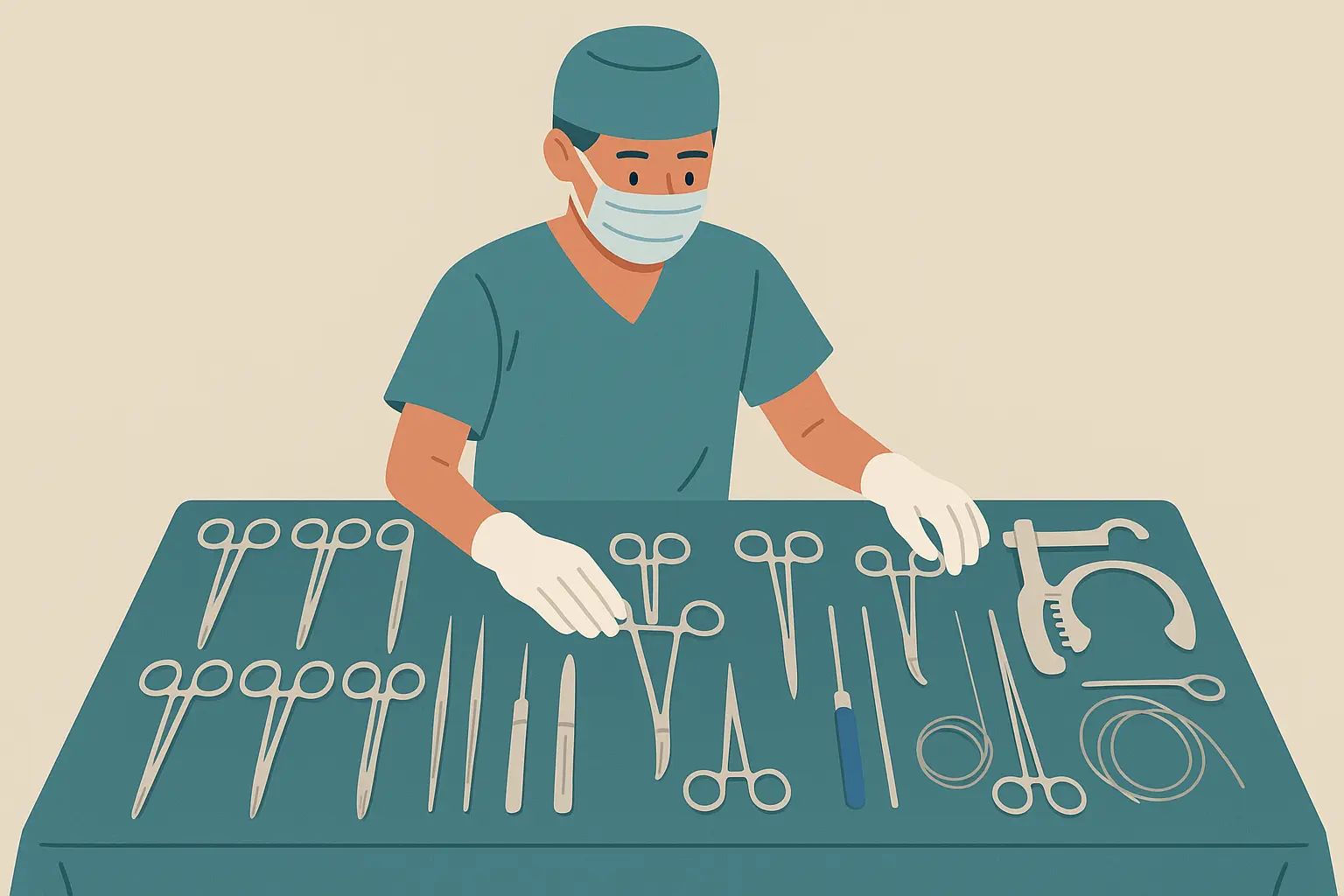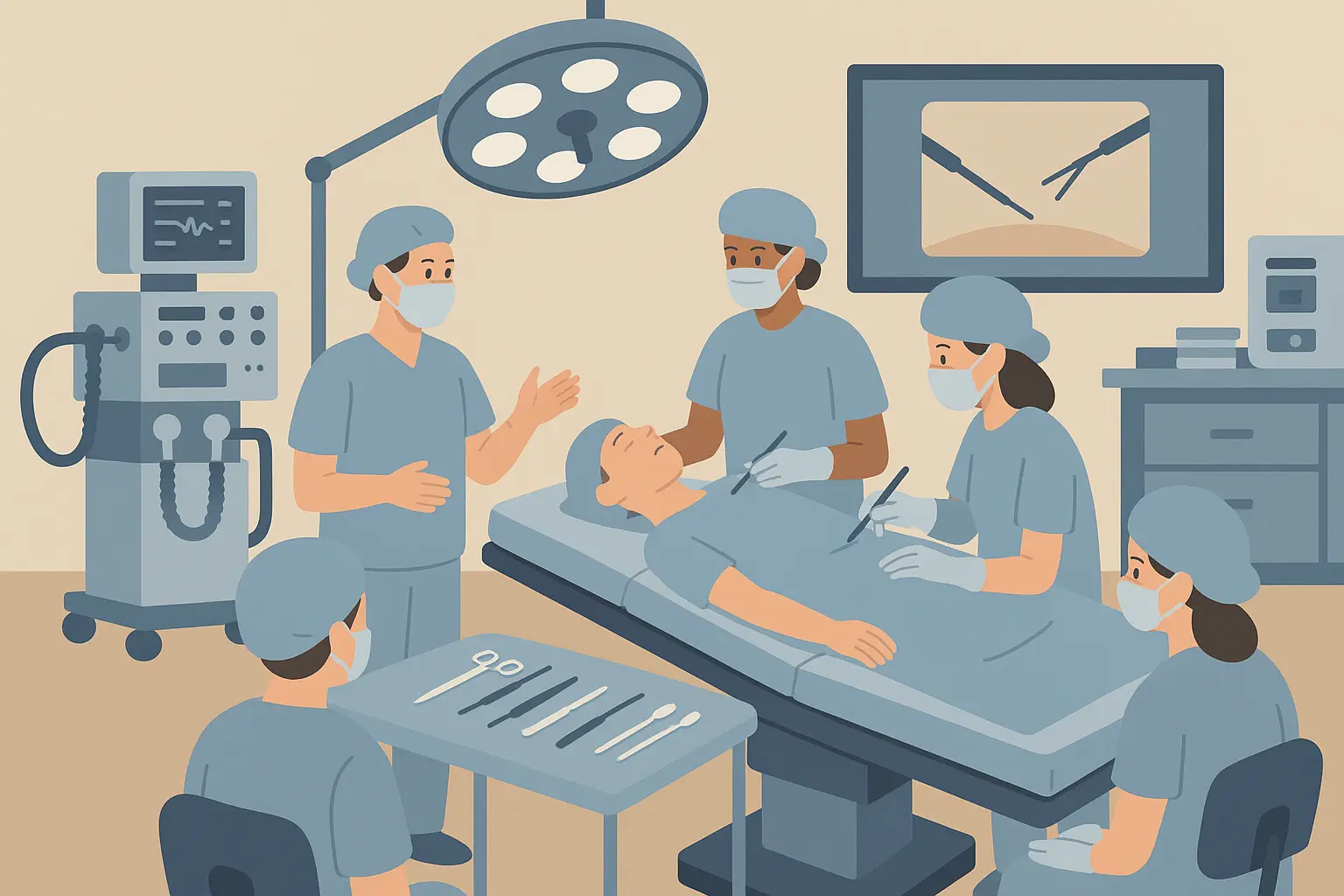Certified Surgical Technologist Salary: What I Wish Someone Had Told Me Before Starting This Career

Table of Contents
-
Understanding What You’ll Actually Make as a Surgical Tech
-
How Certification Changes Your Paycheck (Spoiler: It’s Significant)
-
Where You Work Matters More Than You Think
-
The Real Path to Career Growth and Better Pay
-
Getting Started: Education Costs vs. What You’ll Earn Back
-
Beyond Your Base Salary: The Benefits That Actually Matter
-
How to Ask for More Money (And Actually Get It)
-
Why Your Resume Could Be Costing You Thousands
TL;DR
-
Entry-level surgical techs start around $30,000-$40,000, but experienced professionals can earn $45,000-$60,000+ annually
-
Getting certified as a CST typically adds $3,000-$8,000 to your yearly salary – it’s not optional if you want decent pay
-
Location dramatically affects your earnings – California and New York pay 20-40% more than rural areas
-
Hospitals generally pay better than outpatient centers, but the work is more demanding
-
Specializing in areas like cardiac or neurosurgery can boost your pay by 10-25%
-
Moving into surgical first assistant roles can add $10,000-$20,000 to your annual income
-
Your total compensation package (benefits included) is often worth 20-30% more than your base salary
Understanding What You’ll Actually Make as a Surgical Tech
When I was researching this career five years ago, the certified surgical technologist salary information online was all over the map. One site said I’d make $70K fresh out of school, another warned I’d barely scrape together $25K. The truth? It’s complicated, and nobody talks about what really affects your paycheck.
According to the U.S. Bureau of Labor Statistics, the median annual wage for surgical technologists was $62,830 in May 2024, which gives you a solid benchmark. But here’s what that number doesn’t tell you – where you start and where you can end up are completely different stories.
The Numbers Nobody Talks About
Fresh out of school, you’re looking at maybe $30K-$40K, which honestly isn’t great. I remember feeling pretty deflated when I saw my first paycheck. But here’s where it gets interesting – there’s real room to grow if you play your cards right.
After five years and some smart moves with certifications and specialties, you can realistically hit $45K-$60K or more. The question isn’t just how much do surgical techs make, but how much can you make when you’re strategic about it.
Take Sarah, someone I know who started at $32K in a small Ohio hospital. She felt stuck until she got her CST certification and specialized in orthopedic surgery. Three years later, she’s making $52K at the same place – a $20K jump that came from proving her value and getting the credentials to back it up.
Your ZIP Code Is Your Paycheck
This might be the biggest factor nobody prepared me for. If you’re willing to work in places like California, New York, or Massachusetts, you’re looking at 20-40% higher pay than small-town hospitals. Yeah, everything costs more, but the math usually works in your favor.
I’ve seen surgical techs in San Francisco pulling in $70K+ while their counterparts in rural areas struggle to hit $40K. It’s not just about demand – it’s about what healthcare systems can actually afford to pay.
|
Metropolitan Area |
Average Annual Salary |
Employment Level |
|---|---|---|
|
Los Angeles-Long Beach-Anaheim, CA |
$67,020 |
4,510 |
|
New York-Newark-Jersey City, NY-NJ-PA |
$62,540 |
5,830 |
|
Houston-The Woodlands-Sugar Land, TX |
$57,340 |
2,920 |
|
Dallas-Fort Worth-Arlington, TX |
$54,760 |
3,190 |
|
Chicago-Naperville-Elgin, IL-IN-WI |
$53,490 |
2,650 |
Specialties That Actually Pay More
Not all surgical tech jobs are created equal. Working in cardiac surgery, neurosurgery, or orthopedics can bump your certified surgical technologist salary up by 10-25% compared to general surgery. The work’s more complex, the procedures are longer, and the stakes are higher – but employers pay for that expertise.
A cardiac surgical tech might make $5K-$10K more annually than someone doing routine procedures, even at the same hospital. The learning curve’s steeper, but the payoff is real.
How Certification Changes Your Paycheck (Spoiler: It’s Significant)
Here’s the thing about certification – it’s not just letters after your name. My friend Jake skipped getting certified to save a few hundred bucks. Three years later, he’s still making $35K while certified techs at his hospital start at $42K. Do the math.
Certified Surgical Technologists consistently make $3K-$8K more annually than their non-certified colleagues. Most employers don’t just prefer certified techs anymore – they require them. Without that CST credential, you’re not just earning less, you might not even get interviewed for the good positions.
The CST Premium You Can’t Ignore
Getting your CST certification through the NBSTSA is probably the smartest investment you’ll make in your career. It shows employers you understand sterile technique, surgical procedures, and patient safety at a professional level. That translates directly into higher starting pay and better opportunities.
I’ve watched qualified people get passed over for promotions simply because they lacked certification, while less experienced but certified colleagues moved up. It’s that important.
CST Certification Checklist:
-
Graduate from an accredited surgical technology program
-
Obtain official transcripts from your educational institution
-
Get a notarized letter from your program director
-
Submit application with $290 exam fee
-
Schedule and pass the CST examination
-
Maintain certification with continuing education credits
-
Renew certification every four years
Stacking Skills for Maximum Pay
Once you’ve got your basic CST, don’t stop there. Additional specialty certifications in areas like surgical first assisting or specific procedures can push your certified surgical technologist salary even higher. Each credential shows you’re serious about professional growth, and employers usually pay for that commitment.
Think of it as building a portfolio of skills that each add value to your paycheck. A surgical tech with CST certification plus specialty training in robotic surgery commands significantly higher wages than someone with just basic credentials.
The Continuing Education Investment
Maintaining certification requires ongoing education, which costs time and money. But this isn’t busy work – it keeps your skills current and your salary competitive. The annual cost is minimal compared to the salary advantage certification provides. We’re talking a few hundred dollars in continuing education versus thousands in additional annual earnings.
Where You Work Matters More Than You Think
The type of facility you choose affects way more than just your certified surgical technologist salary – it shapes your entire work experience. I’ve worked in different settings, and the differences are huge. Understanding these trade-offs helps you make smarter decisions about where to focus your job search.
Hospital vs. Outpatient Centers: The Real Deal
Hospitals typically pay more – usually $40K-$60K compared to outpatient centers at $35K-$50K. But hospital work means nights, weekends, and on-call duties. You’re trading higher pay for a more unpredictable schedule and potentially more stressful environment.
Outpatient centers offer predictable Monday-through-Friday schedules with minimal weekend work, but less money. The procedures are often simpler, which is great for work-life balance but might limit your skill development and future earning potential.
The field is evolving with new opportunities. “Umpqua Community College debuts surgical technologist apprenticeship program” KLCC reports that Oregon has about 111 openings per year for surgical technologists, with the average salary in Oregon reaching $74,000 per year, showing strong regional demand.
When planning your healthcare career, it helps to compare options. Medical assistant salaries typically range lower than surgical tech positions, making surgical technology an attractive choice for higher earning potential.
|
Work Setting |
Average Salary Range |
Schedule Flexibility |
Benefits Package |
Career Growth |
|---|---|---|---|---|
|
Hospitals |
$40,000-$60,000 |
Low (nights/weekends) |
Excellent |
High |
|
Outpatient Centers |
$35,000-$50,000 |
High (regular hours) |
Good |
Moderate |
|
Private Practice |
$38,000-$55,000 |
Moderate |
Variable |
Low |
|
Specialty Hospitals |
$45,000-$65,000 |
Low |
Excellent |
High |
|
Ambulatory Care |
$42,000-$57,000 |
High |
Good |
Moderate |
Private Practice: The Middle Ground
Working for private surgical practices can offer competitive pay with more predictable schedules than hospitals. The downside? Benefits packages are often less comprehensive than what you’d get at a large hospital system. You might earn similar money but pay more out-of-pocket for health insurance and retirement benefits.
Private practices also have smaller teams, which means more variety in your daily responsibilities but potentially less opportunity for specialization and advancement.
The Real Path to Career Growth and Better Pay
Surgical technology doesn’t have to be a dead-end career if you’re smart about advancement. There are several ways to significantly boost your certified surgical technologist salary, but they require planning and additional training. The key is thinking about your career as a progression rather than a destination.
The Bureau of Labor Statistics projects that employment of surgical assistants and technologists will grow 5 percent from 2024 to 2034, faster than average, with about 8,700 openings projected each year. This growth creates advancement opportunities, but you need to position yourself to take advantage of them.
Moving Beyond Basic Tech Work
The most direct path to higher earnings is expanding your role within the surgical team. Becoming a Surgical First Assistant can increase your annual earnings by $10K-$20K while giving you more involvement in actual procedures. Management roles like OR supervisor can push salaries to $60K-$80K or more, depending on facility size and your experience.
Each advancement requires additional training and responsibility, but the financial rewards make the investment worthwhile.
The Surgical First Assistant Advantage
Transitioning to a Surgical First Assistant role is probably the most straightforward way to boost your income while staying in the OR. You’ll need additional training and certification, but the investment pays off quickly. First assistants work more closely with surgeons and take on greater responsibilities, which employers compensate accordingly.
According to the U.S. Bureau of Labor Statistics, the median annual wage for surgical assistants was $60,290 in May 2024, demonstrating significant earning potential for those who advance beyond basic roles.
Management Track: Leading Teams and Earning More
If you enjoy mentoring newer staff and have leadership skills, moving into supervisory positions can significantly increase your earning potential. These roles require strong organizational skills and the ability to manage both people and processes, but they offer substantial salary increases and often better benefits packages.
Management positions also provide more regular schedules and the satisfaction of shaping department operations and training programs.
Teaching: Sharing Knowledge for Good Pay
Experienced surgical technologists can transition into educational roles at surgical technology programs. These positions often offer salaries comparable to or exceeding clinical work, with the added benefit of more regular schedules and the satisfaction of training the next generation.
Educational roles also provide opportunities for professional development and can lead to administrative positions within healthcare systems.
Understanding Experience-Based Growth
Your certified surgical technologist salary progression follows predictable patterns based on experience, with the most significant increases happening in your first five years. After that initial growth period, you need to be more strategic about advancement to avoid salary plateaus.
Consider Mike, who started at $35K. After two years, he earned $38K. By year five, with his CST certification and specialty training in neurosurgery, he reached $48K. At year eight, he transitioned to a Surgical First Assistant role, jumping to $58K. His planning resulted in a $23K increase over eight years.
The First Two Years: Proving Your Worth
Once you’ve demonstrated competency and reliability in the OR, you can expect 5-10% salary increases. This is when employers start seeing you as a valuable team member rather than someone they’re still training.
Mid-Career Strategy: Avoiding the Plateau
Around 5-7 years of experience, many surgical techs hit a salary plateau unless they pursue additional certifications , specializations, or leadership roles. This is a critical decision point – you can either accept modest annual increases or invest in advancement opportunities that lead to significant salary jumps.
The surgical techs who earn the most are those who refuse to get comfortable and continuously look for ways to add value to their organizations.
Getting Started: Education Costs vs. What You’ll Earn Back
Look, I’m not going to sugarcoat this – surgical tech school costs money upfront, but it’s one of the smarter investments you can make in healthcare. Most programs run anywhere from $5,000 for a basic certificate to around $30,000 for a full associate degree. Sounds scary? Here’s the reality check: you’ll likely make that back within your first two to three years working.
When I was deciding whether to go for it, I literally sat at my kitchen table with a calculator for hours. The numbers worked then, and they work even better now with hospitals desperate for qualified people.
Picking Your School: Fast Track vs. Deep Dive
You’ve got two main paths here. Certificate programs get you working faster – we’re talking 6 to 18 months – but cost less and sometimes limit where you can go later. Associate degrees take two years and cost more, but you’ll often start at higher pay and have better advancement opportunities.
My advice? If you’re broke and need to start earning yesterday, go certificate. If you can swing the time and money, the degree usually pays off long-term. Just don’t get stuck in analysis paralysis – either path beats staying where you are if you’re unhappy.
New educational models are emerging to address workforce needs. “Allied Medical Careers with Little School, Good Pay” Nurse.org reports that surgical technologist programs generally take between 1 to 2 years to complete, with costs ranging from $5,000 for certificate programs to $15,000 or more for public college programs, making it an accessible entry point into healthcare. When considering healthcare career options, it’s worth comparing educational requirements across different fields. For instance, certified pharmacy technician programs have similar timeframes but different earning potentials, helping you make informed decisions about your healthcare career path.
Making the Numbers Work
The certification exam itself runs about $290, plus maybe another few hundred for study materials. Yeah, it stings when you’re already stretched thin, but remember – certified techs make thousands more per year. It’s literally the best $500 you’ll ever spend on your career.
Education Investment Calculator:
-
Certificate Program: $5,000-$15,000 (6-18 months)
-
Associate Degree: $15,000-$30,000 (2 years)
-
Entry-level salary: $30,000-$40,000
-
Break-even point: 2-3 years
-
Lifetime earning potential: $1.2-$2.4 million
The Certification Process: Investment and Timeline
Getting certified involves specific costs and timelines that directly impact your earning potential. While the upfront investment might seem substantial when you’re just starting out, remember that certification typically adds thousands to your annual certified surgical technologist salary – making it one of the best investments you can make.
Exam Preparation: Doing It Right the First Time
Failing the certification exam means retaking it (and paying again), so investing in proper preparation makes financial sense. Quality review courses and materials might cost a few hundred dollars, but they’re worth it to avoid the cost and delay of retaking the exam. Plus, being certified from day one means you start earning that certification premium immediately.
Ongoing Costs That Pay for Themselves
Maintaining certification requires continuing education credits and renewal fees, representing ongoing professional investment. However, these costs are minimal compared to the salary advantage certification provides. Think of it as insurance for your earning potential – a small annual investment that protects your ability to command higher wages.
Beyond Your Base Salary: The Benefits That Actually Matter
Here’s what nobody tells you about healthcare jobs – the benefits can be worth more than your actual paycheck. I’m talking health insurance that would cost you $800+ a month if you bought it yourself, retirement matching that’s basically free money, and paid time off that actually lets you take vacations.
My first job, I was so focused on that hourly rate that I totally ignored benefits. Big mistake. I ended up at a place with cheap insurance and no retirement match. Sure, my base pay looked good, but I was actually making less than friends at “lower paying” hospitals with amazing benefits.
Insurance That Actually Covers Stuff
Working in healthcare means you usually get excellent health coverage – which is pretty ironic since you’re around sick people all day. Most full-time positions include medical, dental, and vision. Some places even throw in life insurance and disability coverage.
Do the math on this. Family health insurance can easily cost $1,500+ monthly if you’re buying it yourself. When your employer covers most of that, it’s like getting a $15,000 raise you never see in your paycheck.
Given the physical nature of surgical technology work, disability insurance protection is crucial. Many employers provide both short-term and long-term disability coverage, which protects your income if you’re injured on the job or develop health issues that prevent you from working. This coverage would be expensive to purchase individually, making employer-provided disability insurance extremely valuable.
Building Wealth While You Sleep
The retirement benefits in healthcare can be incredible. Many hospitals match 3-6% of what you put into your 401(k) – that’s literally free money. Some older hospital systems still have actual pensions, which are basically extinct everywhere else.
Take my colleague Sarah. She makes $48K base, but gets $12K worth of health benefits, $2,400 in 401(k) matching, plus other perks. Her real compensation is over $60K. That’s a 25% boost just from benefits.
Jennifer works at a major hospital system earning $48,000 annually. Her benefits package includes $12,000 in health insurance coverage, $2,400 in 401(k) matching (5% of salary), and $1,800 in other benefits (dental, vision, life insurance). Her total compensation is actually $64,200 – 34% higher than her base salary.
Education Benefits That Support Career Growth
Tuition reimbursement programs support continued learning and certification maintenance, often covering $2,000-$5,000 annually. These benefits help you advance your career without taking on additional debt, making them particularly valuable for surgical techs looking to specialize or move into leadership roles.
How to Ask for More Money (And Actually Get It)
Asking for a raise feels awkward, but here’s the thing – if you don’t ask, the answer’s automatically no. Most surgical techs never negotiate because they think healthcare is different. It’s not. You just need to approach it right.
First rule: never make it about your bills or personal needs. Nobody cares that your rent went up. Make it about what you bring to the table. Did you help train new staff? Master a difficult specialty? Improve OR turnover times? That’s your ammunition.
Learning effective negotiation strategies is crucial for career advancement. Our comprehensive guide on how to ask for a raise provides proven techniques that work specifically in healthcare settings, helping you approach salary discussions with confidence and preparation.
Timing Is Everything
Don’t randomly walk into your boss’s office asking for more money. Wait for your annual review, or better yet, right after you complete additional training or certification. Budget cycles matter too – most hospitals plan raises in late fall or early winter for the next year.
I’ve seen techs get turned down in July and get approved for the same request in November, simply because of timing.
Salary Negotiation Timeline:
-
Research market rates 3 months before review
-
Document achievements and contributions
-
Complete any pending certifications
-
Schedule meeting during budget planning period
-
Prepare written proposal with supporting data
-
Practice negotiation conversation
-
Follow up in writing after discussion
Do Your Homework
Know what people in similar positions make at other hospitals in your area. But don’t just print out some generic salary survey – actually talk to people. Professional associations, online forums, even casual conversations with techs from other facilities give you real-world data.
When you walk in prepared with specific numbers and examples of your value, you’re having a business conversation, not begging for charity.
Making Your Case with Data
Employers respond to concrete examples of your value. Track metrics like case turnover times, patient satisfaction scores, or training contributions. If you’ve helped reduce supply costs, improved scheduling efficiency, or mentored new staff, quantify these contributions. This approach transforms salary negotiations from asking for a favor to presenting a business case for investment in your continued employment.
Why Your Resume Could Be Costing You Thousands
Your resume is probably boring. Sorry, but it’s true. Most surgical tech resumes read like job descriptions – “Maintained sterile field, assisted surgeons, prepared instruments.” Yawn. That tells me nothing about why you’re better than the other 50 people applying.
Instead, show impact. “Reduced case setup time by 15% through improved instrument organization” or “Trained 12 new surgical techs with 100% certification pass rate.” Numbers grab attention and prove you’re not just another warm body in scrubs.
Creating a compelling healthcare resume requires understanding what employers look for in surgical tech candidates. Our medical assistant resume examples demonstrate effective healthcare resume formats that can be adapted for surgical technology positions, showcasing technical skills and certifications prominently.
Understanding proper resume formatting is crucial for healthcare professionals. Learn about ATS-friendly resume formats that ensure your surgical tech qualifications pass through hospital screening systems and reach hiring managers who make salary decisions.
What Hospitals Actually Want to See
Certifications go at the top – not buried in some education section. If you’re CST certified, that needs to be the first thing they see. Same with any specialty training in robotics, cardiac, or neuro procedures.
Use keywords that match the job posting. Hospitals use automated systems to screen resumes, and if you don’t have the right words, a human never sees your application. It’s frustrating but true.
Standing Out in a Sea of Scrubs
Everyone lists the same basic skills. What makes you different? Maybe you speak Spanish in an area with lots of Hispanic patients. Perhaps you have experience with specific equipment brands. Or you’ve worked in multiple specialties while others stick to general surgery.
These details matter because they solve problems for hiring managers. They’re not just hiring a surgical tech – they’re hiring someone to fill specific needs.
Resume Builder IQ’s AI-powered platform addresses the unique challenges surgical technologists face when competing for premium positions. The platform’s ATS-friendly templates ensure your certifications, specialized training, and technical skills pass through hospital screening systems that might otherwise filter out qualified candidates.
With industry-specific content suggestions, you can effectively highlight critical competencies like sterile technique mastery, surgical instrumentation expertise, and patient safety protocols. Whether you’re a new graduate seeking your first position or an experienced tech pursuing specialized roles, Resume Builder IQ’s tailored approach helps you present qualifications that maximize salary potential across different healthcare settings.
The Bottom Line
Surgical technology can absolutely provide a solid middle-class living, but it requires some strategy. You can’t just show up, do the minimum, and expect to get rich. But if you’re willing to get certified, specialize in high-demand areas, and be smart about where you work, you can build a career that pays the bills and then some.
The people making $60K+ didn’t get there by accident. They made deliberate choices about education, certification, and career moves. The good news? There’s nothing stopping you from doing the same thing.
This field needs good people, and hospitals are willing to pay for competency and reliability. The question isn’t whether you can make decent money as a surgical tech – it’s whether you’re willing to do what it takes to position yourself for the better opportunities.
Your certified surgical technologist salary potential is real, but it requires more than just showing up. Get certified, specialize when possible, and don’t be afraid to advocate for yourself. The opportunities are there for people willing to go after them.









